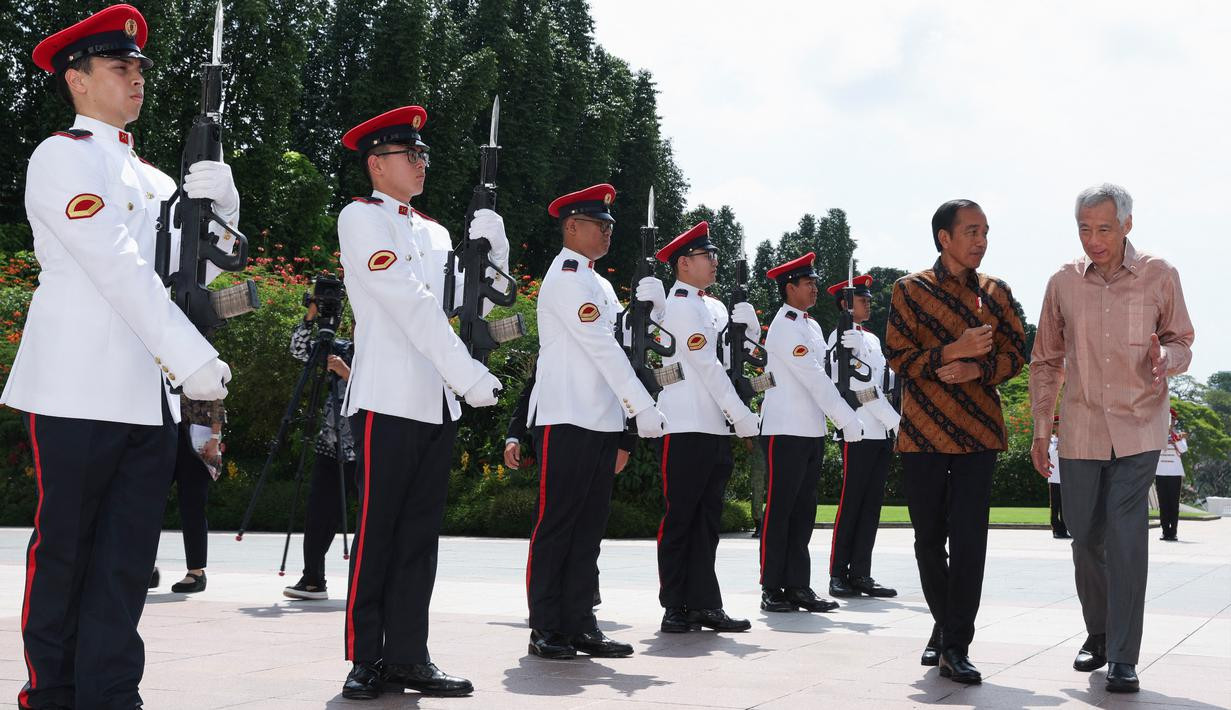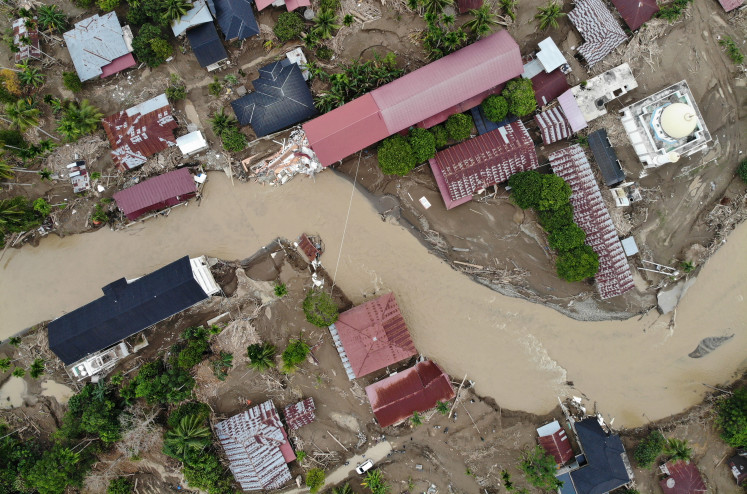Popular Reads
Top Results
Can't find what you're looking for?
View all search resultsPopular Reads
Top Results
Can't find what you're looking for?
View all search resultsThe maturing of a pragmatic partnership in Indonesia-Singapore ties
Leaving office with Indonesia-Singapore relations at its bilateral pinnacle will emblazon Jokowi as an elder statesman in the annals of the diplomatic history of Southeast Asia.
Change text size
Gift Premium Articles
to Anyone
P
resident Joko “Jokowi” Widodo’s visit to Singapore last week comes at a pivotal moment for Indonesia-Singapore relations. Indonesia’s ratification of three agreements with Singapore on the issues of air space management, defence cooperation and extradition of fugitives under the expanded framework removes bilateral aggravations in Indonesia-Singapore relations and paves the way for deepening their constructive engagement in strategic areas of mutual cooperation to benefit their respective domestic populaces.
The six new and wide-ranging Memorandums of Understanding (MoUs) inked at the Singapore-Indonesia Leaders’ Retreat on March 16 between Jokowi and Singapore’s Prime Minister Lee Hsien Loong along with nine business-to-business agreements signed concurrently testifies to the fruitfulness of this four-eyed meeting. The deepening bilateral engagement between Indonesia and Singapore also illustrates how two countries of vastly different sizes can boost political trust and cooperate constructively for mutual benefit.
This bilateral meeting also sought to prepare for a shared future shaped by cultural technopreneurship and digital technology, including artificial intelligence. Culminating in the launch of the Tech X program, which is the wave of the future in Indonesia-Singapore relations, youths are made the focal point for both countries to work together in nurturing tech talent and establishing smart cities, especially in Indonesia.
The leaders’ retreat ended on a high note because the meeting took place behind closed doors encircled by a diplomatic air of positivity. It enabled both leaders to address complicated issues by conducting their candid diplomacy away from the public spotlight. The strong political leadership required to overcome domestic impediments such as extreme Indonesian nationalism and internal conflicts was epitomized at this meeting and integral to achieving the propitious outcomes. It also signifies ‘maturing pragmatism’ in Indonesia-Singapore relations that looks beyond the domestic by emphasizing inter-state cooperation.
The budding bromance between Jokowi and Lee was instrumental in achieving symbiotically even-keeled Indonesia-Singapore relations, underscoring the role of individuals as being essential for effective bilateral diplomacy in foreign policy analysis. Trickling down from the highest level of political leadership also helps chip away at Indonesia’s “big brother” mindset in perceiving Singapore as a “little red dot”, as the strive for bilateral equality in Indonesia-Singapore relations will be vital to securing a sustainable future.
With Indonesia seeking to generate greater momentum in replacing Jakarta with Nusantara as the new national capital in 2024, the Jokowi administration has identified Singapore as its first choice to invest in the Nusantara project. This is because Singapore has been the top foreign investor in Indonesia since 2014 and during Jokowi’s visit to Singapore, there were at least 20 letters of intent to invest in Nusantara from the country’s private sector companies. As foreign investments will be key to the success of the Nusantara project, Singapore’s investor role will be pivotal in the sustainability of Nusantara as the new capital city. Shifting its focus on Nusantara is aligned with Singapore’s strategic foresight of investing beyond Jakarta.
Galvanized by the Indonesian archipelagic vision of effective geopolitics known as Wawasan Nusantara, Nusantara diplomacy is now a cornerstone in Indonesia’s foreign policy. Leveraging on the new capital city project, Nusantara diplomacy is aimed at enhancing Indonesia’s self-image in its external relations while also enlivening the nationalistic spirit of its domestic population. It is through the prism of Nusantara diplomacy that Indonesia is bilaterally engaging other countries in Southeast Asia, leading to Singapore riding on the Nusantara wave to further amplify its economic benefits in terms of trade and investment.
The practice of Nusantara diplomacy in Indonesia’s foreign policy is integral in taking Indonesia-Singapore relations to the next level of bilateral engagement, essential for Indonesia to play the role of an active regional multilateralist through ASEAN amid the wider Indo-Pacific, and central to Indonesia cementing its position as a secular middle power with Islamic characteristics in international affairs.
That Indonesia continues to be viewed as a moderate, pluralistic, and civilizational force resonates with Singapore as it augurs well for regional peace and stability. The emphasis on civilizational dialogue and cultural diversity, especially at the people-to-people level, further solidifies Indonesia-Singapore relations, not least by serving as a countermeasure against extremism, violence (terrorism) and (self)-radicalization.
For Indonesia to play a pacesetting diplomatic role as chairman of ASEAN, it has to provide imaginative and consultative leadership to deal with regional challenges, such as the Myanmar issue, and garner the support of ASEAN member-states, including Singapore.
As Indonesia and Singapore are on the same page in their vocal criticism of Myanmar junta not abiding by the five-point consensus to return the country onto the path of democratization, Indonesia will be counting on Singapore to support its efforts as a multilateral mediator and honest broker to resolve the crisis in Myanmar. The more robust Indonesia-Singapore relations is, the stronger and more cohesive ASEAN will be as a regional organization, as the bilateral relationship between Indonesia and Singapore is one of the most important in Southeast Asia.
Going forward, the litmus test is the bilateral sustainability of MoUs delivering on the stated outcomes. The challenge is not to be hijacked by domestic politics, namely on the part of Indonesia where Singapore has tended to be used as a punching bag to rally political support. Potential undercurrents due to fractious issues such as the transboundary haze remains a cause for concern. But as there is an atmosphere for positivity and a framework for consultation and cooperation, contentious issues can be resolved amicably.
Leaving office with Indonesia-Singapore relations at its bilateral pinnacle will emblazon Jokowi as an elder statesman in the annals of the diplomatic history of Southeast Asia. Should Jokowi resolve the Myanmar crisis on his watch, he will also be lauded for his regional statesmanship. As Indonesia transitions to a post-Jokowi period, President Jokowi will no doubt be remembered as a good and reliable friend of Singapore.
Despite the occasional twists and turns that are emblematic of bilateralism, the good news is that we are seeing the maturing of a pragmatic partnership in Indonesia-Singapore relations. This upward trajectory is expected to continue albeit changes in government, as the next generation of leaders in both countries seem to recognize the mutual advantages that are derived from earnestly cooperating with each other.
***
The writer is a senior international affairs analyst at Solaris Strategies Singapore and visiting professor in International Relations at the Islamic University of Indonesia, Yogyakarta











